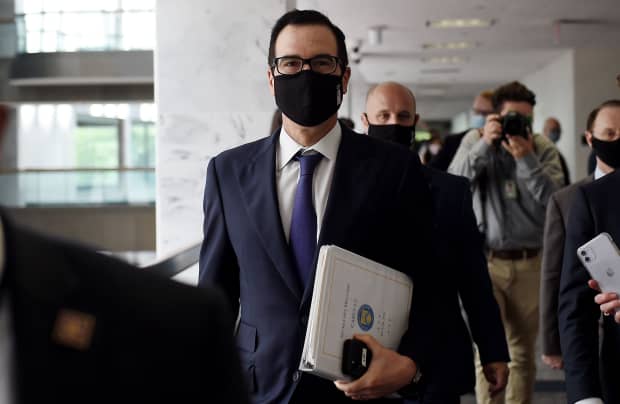This post was originally published on this site

Treasury Secretary Steven Mnuchin is shown in July.
The top Senate Democrat on Monday dismissed as “fables” President Donald Trump’s assertion congressional Democrats were folding in the standoff over additional coronavirus aid.
One of Trump’s negotiators, Treasury Secretary Steven Mnuchin, said a deal was still possible but only if Democrats gave up significant asks they had made in talks that broke down Friday.
Read more: Stimulus talks appear to end with a whimper, not a bang
In the wake of Trump’s actions over the weekend to make an end run around Congress and provide unemployment aid and other relief through presidential memorandums and an executive order, the dueling television interviews Monday of Senate Democratic Leader Chuck Schumer and Mnuchin gave little reason to think there was much movement.
Read more: Republican senator calls Trump’s stimulus executive order ‘unconstitutional slop’
That’s in contrast with Trump’s rhetoric, which he continued in a Tweet Monday, that Democrats were now the ones wanting a deal. In the Tweet, he said Schumer and House Speaker Nancy Pelosi want to meet. “They know my phone number!” he said.
Schumer said neither he nor Pelosi had reached out by phone to the White House.
“Fables from Donald Trump. Fables,” Schumer said in an interview on MSNBC when asked about Trump’s assertion that they wanted a meeting. “I didn’t call him. Speaker Pelosi didn’t call him. No, we didn’t call him.”
In an interview on CNBC, Mnuchin said the administration remained ready to deal, but only if a bargain made sense.
“When [the Democrats] are reasonable, we can get deals done. If they’re going to be unreasonable, we’re not going to get a deal done,” Mnuchin said.
“If there’s a fair deal to do, we’ll do a fair deal.”
Mnuchin called Democratic demands for more than $900 billion in aid to states, localities and tribes to offset lost revenues and increased expenses due to the coronavrus “absurd” and dismissed the idea of splitting the difference in areas where the two sides disagree on policy.
But he noted two areas where there was widespread bipartisan agreement: money to help schools and colleges reopen safely and a revival of the Paycheck Protection Program loan forgiveness initiative for small businesses.
“The president will be more than happy to sign a standalone education bill. Well, let’s get that done. Let’s not hold up our kids,” he said.
While the White House proposal called for $105 billion, more than the May Democratic bill’s $100 billion, Pelosi has said they need more than the May figure and that she disagreed with the administration’s desire to give more money to schools that reopened with in-person classes.
Asked when the two sides would get together again after two weeks of near-daily talks, Mnuchin said, “I’m not going to comment on the specifics of the logistics of negotiations. I don’t think that that’s helpful.”



